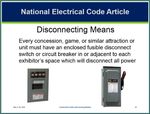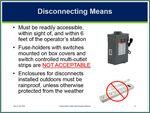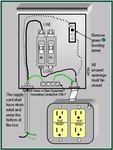Electrical Code Rules for Portable & Temporary Electrical Power Distribution
←
→
Page content transcription
If your browser does not render page correctly, please read the page content below
Electrical Code Rules for Portable & Temporary Electrical Power Distribution
A summary of rules based on the National Electrical Code – refer to the NEC for additional rules
110.3 Electrical Equipment. All electrical equipment must be listed and labeled. Equipment must be installed and used in
accordance with the listing. Damaged or defective electrical equipment must be repaired or replaced.
590.2. Approval. Temporary wiring methods shall be acceptable only if approved, based on the conditions of use.
525.21 Disconnecting Means. A means to disconnect each portable structure from all ungrounded conductors must be provided.
The switch must consist of no more than six enclosed switches or circuit breakers and must be located within sight of and within 6
feet of the operator’s station. Fuseholders with switches mounted on box covers and switch controlled multioutlet strips are not
acceptable as the required disconnecting means. Enclosures for disconnect switches and circuit breakers installed outdoors must be
rainproof unless otherwise protected from the weather by location. Where accessible to unqualified persons, the disconnecting
means must be lockable.
525.20 Portable Cords. Portable cords must be size 12 AWG or larger Type G, PPE, S, SE, SEO, SEOO, SC, SCE, SCT, SO, SOO, ST, STO,
STOO, W or other types identified for extra-hard usage and must be of the grounding type. The cord type is printed or embossed on
approved cords. Two-wire cords are not allowed. Cables with a “J” in the type designation (such as Type SJT) are junior-hard-service
rated and are not permitted to be used where subject to physical damage. When used outdoors, all cords must be listed for wet
locations and be sunlight resistant, unless they are an integral part of listed portable equipment. All cords must be continuous and
contain no splices. Temporary repair of a cord outer jacket must be made with listed repair kits and is subject to approval from the
electrical inspector.
525.20 Mechanical Protection. Flexible cords and cables laid on the ground must be approved for extra-hard usage, routed and
arranged to minimize the tripping hazard and be protected from accidental and physical damage. Where passing through doorways
or other pinch points, protection must be provided. Cords and cables may be covered with approved non-conductive mats. Mats
must be self-weighted to minimize movement and drape over cords and cables.
250.114 Equipment Connected by Cord- and Plug. Exposed metal parts of cord-and-plug-connected equipment must be connected
to the equipment grounding conductor. Cords must have a grounding conductor and grounding type attachment plug. Listed double
insulated equipment is permitted.
525.23 Ground-Fault Circuit-Interrupter Protection. In addition to the 210.8(B) requirements, GFCI protection shall be provided for
125-volt, single phase, 15- and 20-ampere receptacle outlets that are used by personnel for assembly and disassembly, or readily
accessible to the general public. Manufactured cord sets incorporating listed ground-fault circuit-interrupter protection for
personnel shall be permitted.
525.23 (D) Receptacles Supplied by Portable Cords. When GFCI protection is provided by 125-volt, 15- or 20-amp GFCI receptacles,
and the branch circuits are supplied by a flexible cord, the GFCI protection must be listed, labeled and identified for portable use
(open neutral sensing and protection). This does not apply to GFCI receptacles that are permanently installed in rides or structures
even though the ride or structure is supplied by a flexible cord. This also does not apply to feeders that utilize flexible cord.
525.3, 680.1 Attractions Using Contained Volumes of Water. Electrical wiring for, and equipment in or adjacent to pools, fountains
or contained volumes of water must be installed in accordance with NEC Article 680.
443 Lafayette Road N., St. Paul, MN 55155 • (651) 284-5005 • www.dli.mn.gov525.3, 640.1 Audio Signal and Amplification Equipment. Temporary wiring for public address systems, audio systems and electronic
musical instruments must be installed in accordance with NEC Article 640.
525.21 Portable Wiring inside Tents. All lamps for general illumination must be protected from accidental contact or breakage by a
suitable guard. Overhead lighting must be installed at least 10 feet above ground where it is accessible to the public.
404.4 Damp Locations. Switches used outdoors must have weatherproof covers.
406.9 Receptacles. Receptacles protected from the weather must have an enclosure that is weatherproof with the receptacle
covers closed (in-use cover). An outlet box hood (cover) installed for this purpose must be listed and identified as “extra duty.” All
15- and 20-ampere, 125- and 250-volt receptacles used outdoors must be listed as weather-resistant (WR).
445.14 Protection of Live Parts. Live parts of generators must not be exposed to accidental contact.
445.20 Ground-Fault Circuit-Interrupters. All 125-volt and 125/250-volt, single-phase, 15- and 20-ampere receptacle outlets that are
part of a 15kW or smaller portable generator must have listed ground-fault circuit-interrupter protection for personnel.
250.30 Grounding Electrode. Generators that do not comply with 250.34 must have a grounding electrode system that complies
with Part 3 of Article 250. However, for transient installations it is acceptable to install three ground rods driven at least six feet
apart and driven more than four feet into the earth.
525.11 Multiple Sources of Supply. Where multiple separately derived systems or services or both supply rides, games, attractions
or other structures that are separated by less than 12 feet, all sources must be bonded to the same grounding electrode system.
525.5 Overhead Clearances. A clearance of 15 feet in any direction must be maintained from overhead conductors operating at 600
volts or less and any portion of an amusement ride or attraction. No portion of an amusement ride or attraction may be located
under or within 15 feet horizontally of conductors operating at over 600 volts.
240.20 and 240.22 Overcurrent Protective Devices. Motors and lighting circuits must have separate fuses or circuit breakers.
Lighting circuits must be protected at no more than 20 amperes. Motors must be protected at not over 125% of full load current or
must be thermally protected. All cords, cables and equipment must be protected from overcurrent by properly sized fuses or circuit
breakers.
525.31 Equipment Grounding. Equipment grounding conductors must be installed with all feeders and branch circuits. Exposed
metal parts of electrical equipment must be bonded, and if cord connected, the cord must have an equipment grounding conductor
and grounding type attachment plug. Equipment that is listed and labeled as double insulated is permitted. All grounding conductors
in an enclosure must terminate in a common grounding bus or lugs. The equipment grounding bar or lug(s) must be secured to the
electrical enclosure with screws or bolts used for no other purpose. Approved means must be used to connect equipment grounding
conductors to enclosures.
250.34 Portable Generators. Generators that supply only loads connected directly to receptacle outlets mounted on the generator
and where the equipment grounding terminals of the receptacles are bonded to the generator frame shall not be required to be
connected to a grounding electrode system. Marking by the manufacturer must indicate whether or not the generator neutral is
bonded to the generator frame.
250.142 Isolated Neutral or Grounded Conductor. (White Conductor) The neutral conductor must be isolated from the equipment
grounding conductor and all metal noncurrent carrying parts beyond the service disconnect or the system bonding jumper at the
generator or other separately derived system.
CAUTION: THIS INFORMATION IS NOT INTENDED TO BE YOUR ONLY
ELECTRICAL INFORMATION RESOURCE. ADDITIONAL INFORMATION
AND KNOWLEDGE ARE NECESSARY FOR AN ELECTRICAL INSTALLATION
THAT COMPLIES WITH THE NATIONAL ELECTRICAL CODE (NEC) AND IS
FREE FROM FIRE AND ELECTRIC SHOCK HAZARDS.
2
eli_portable-power-code CarnivalsSummaryOfCodeRules Checked 20200317Examples of temporary portable electrical distribution equipment 3 eli_portable-power-code CarnivalsSummaryOfCodeRules Checked 20200317
You can also read



























































